North Korea - KP - PRK - PRK - East and Southeast Asia
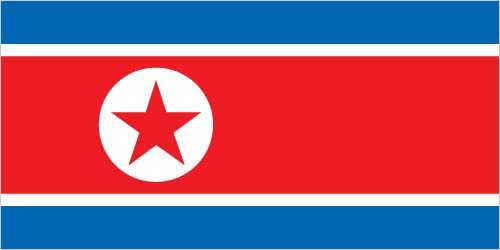
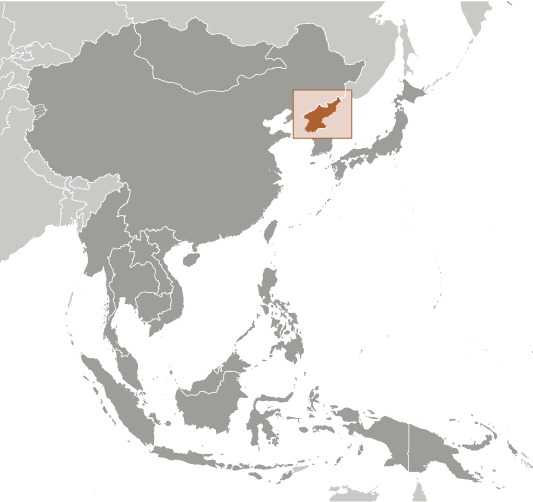
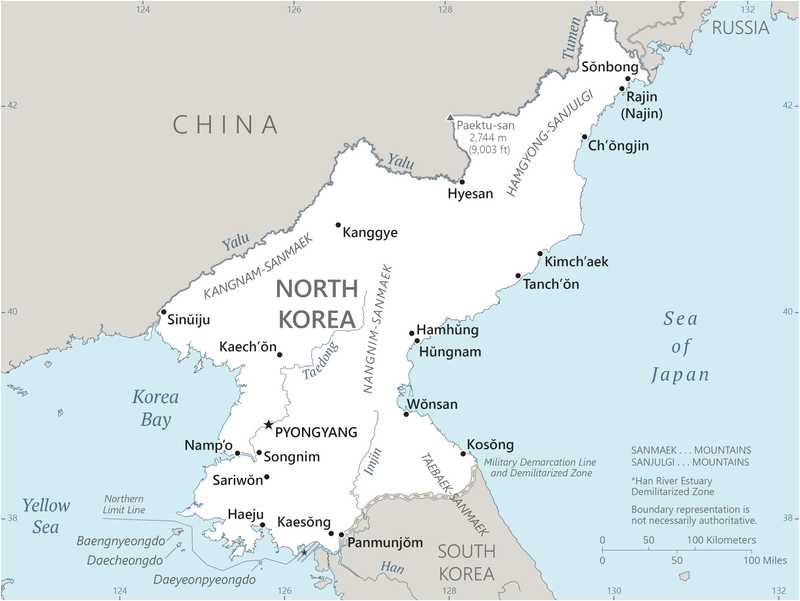
Korea, North Images
Korea, North Factbook Data
Diplomatic representation from the US
Age structure
15-64 years: 68.9% (male 9,054,771/female 9,066,447)
65 years and over: 11.2% (2024 est.) (male 1,099,676/female 1,855,175)
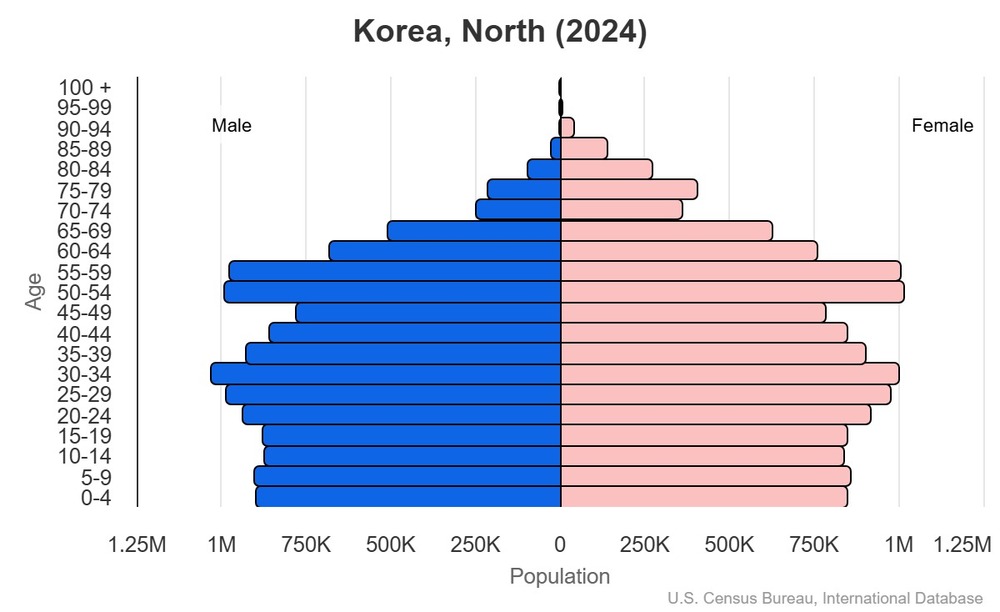
For additional information, please see the entry for Population pyramid on the Definitions and Notes page.
Geographic coordinates
Sex ratio
0-14 years: 1.05 male(s)/female
15-64 years: 1 male(s)/female
65 years and over: 0.59 male(s)/female
total population: 0.95 male(s)/female (2024 est.)
Natural hazards
volcanism: P'aektu-san (2,744 m) (also known as Baitoushan, Baegdu, or Changbaishan), on the Chinese border, is considered historically active
Area - comparative
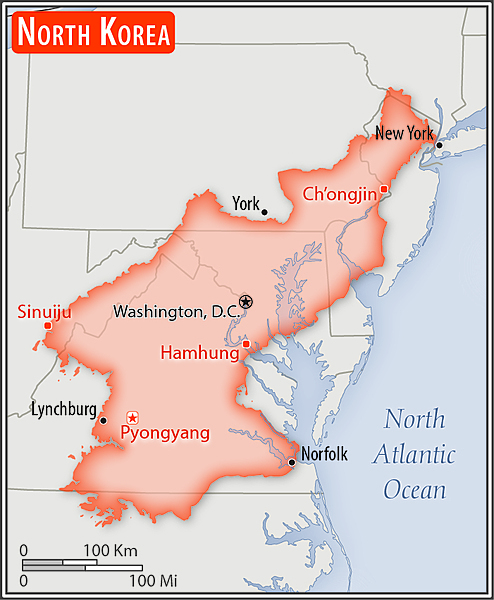
slightly larger than Virginia; slightly smaller than Mississippi
Military service age and obligation
Background
The first recorded kingdom (Choson) on the Korean Peninsula dates from approximately 2300 B.C. Over the subsequent centuries, three main kingdoms -- Kogoryo, Paekche, and Silla -- were established on the Peninsula. By the 5th century A.D., Kogoryo emerged as the most powerful, with control over much of the Peninsula and part of Manchuria (modern-day northeast China). However, Silla allied with the Chinese to create the first unified Korean state in 688. Following the collapse of Silla in the 9th century, Korea was unified under the Koryo (Goryeo; 918-1392) and the Chosen (Joseon; 1392-1910) dynasties. Korea became the object of intense imperialistic rivalry among the Chinese (its traditional benefactor), Japanese, and Russian empires in the latter half of the 19th and early 20th centuries. After the Sino-Japanese War (1894-95) and the Russo-Japanese War (1904-05), Korea was occupied by Imperial Japan. In 1910, Japan formally annexed the entire peninsula. After World War II, the northern half came under Soviet-sponsored communist control.
In 1948, North Korea (formally known as the Democratic People's Republic of Korea or DPRK) was founded under President KIM Il Sung, who consolidated power and cemented autocratic one-party rule under the Korean Worker's Party (KWP). North Korea failed to conquer UN-backed South Korea (formally the Republic of Korea or ROK) during the Korean War (1950-53), after which a demilitarized zone separated the two Koreas. KIM's authoritarian rule included tight control over North Korean citizens and the demonization of the US as the central threat to North Korea's political and social system. In addition, he molded the country's economic, military, and political policies around the core objective of unifying Korea under Pyongyang's control. North Korea also declared a central ideology of juche ("self-reliance") as a check against outside influence, while continuing to rely heavily on China and the Soviet Union for economic support. KIM Il Sung's son, KIM Jong Il, was officially designated as his father's successor in 1980, and he assumed a growing political and managerial role until the elder KIM's death in 1994. Under KIM Jong Il's reign, North Korea continued developing nuclear weapons and ballistic missiles. KIM Jong Un was publicly unveiled as his father's successor in 2010. Following KIM Jong Il's death in 2011, KIM Jong Un quickly assumed power and has since occupied the regime's highest political and military posts.
After the end of Soviet aid in 1991, North Korea faced serious economic setbacks that exacerbated decades of economic mismanagement and resource misallocation. Since the mid-1990s, North Korea has faced chronic food shortages and economic stagnation. In recent years, the North's domestic agricultural production has improved but still falls far short of producing sufficient food for its population. Starting in 2002, North Korea began to tolerate semi-private markets but has made few other efforts to meet its goal of improving the overall standard of living. New economic development plans in the 2010s failed to meet government-mandated goals for key industrial sectors, food production, or overall economic performance. At the onset of the COVID-19 pandemic in 2020, North Korea instituted a nationwide lockdown that severely restricted its economy and international engagement. Since then, KIM has repeatedly expressed concerns with the regime's economic failures and food problems, but in 2021, he vowed to continue "self-reliant" policies and has reinvigorated his pursuit of greater regime control of the economy.
As of 2024, despite slowly renewing cross-border trade with China, North Korea remained one of the world's most isolated countries and one of Asia's poorest. In 2024, Pyongyang announced it was ending all economic cooperation with South Korea. The move followed earlier proclamations that it was scrapping a 2018 military pact with South Korea to de-escalate tensions along their militarized border, abandoning the country’s decades-long pursuit of peaceful unification with South Korea, and designating the South as North Korea’s “principal enemy.”
Environmental issues
International environmental agreements
signed, but not ratified: Antarctic-Environmental Protection, Law of the Sea
Exports - commodities
note: top five export commodities based on value in dollars
Exports - partners
note: top five export partners based on percentage share of exports
Administrative divisions
provinces: Chagang, Hambuk (North Hamgyong), Hamnam (South Hamgyong), Hwangbuk (North Hwanghae), Hwangnam (South Hwanghae), Kangwon, P'yongbuk (North Pyongan), P'yongnam (South Pyongan), Ryanggang
special administration cities: Kaesong, Nampo, P'yongyang, Rason
note: P'yongyang is considered a directly controlled city; Kaesong, Nampo, and Rason are designated as special cities
Agricultural products
note: top ten agricultural products based on tonnage
Military and security forces
Ministry of Social Security (formerly Ministry of Public Security): Border Guard General Bureau, civil security forces; Ministry of State Security: internal security, investigations (2025)
note 1: Kim Jong Un is the KPA supreme commander, while operational control of the armed forces resides in the General Staff Department (GSD), which reports directly to Kim; the GSD maintains overall control of all military forces and is charged with turning Kim’s directives into operational military orders; the Ministry of National Defense (MND) is responsible for administrative control of the military and external relations with foreign militaries
note 2: the Security Guard Command protects the Kim family, other senior leadership figures, and government facilities
note 4: the North also has a large paramilitary/militia force organized into the Worker Peasant Red Guard and Red Youth Guard; these organizations are present at all levels of government (province, county, ward) and are under the control of the Korean Workers' Party in peacetime, but revert to KPA control in crisis or war; they are often mobilized for domestic projects, such as road building and agricultural support
Capital
geographic coordinates: 39 01 N, 125 45 E
time difference: UTC+9 (14 hours ahead of Washington, DC, during Standard Time)
time zone note: on 5 May 2018, North Korea reverted to UTC+9, the same time zone as South Korea
etymology: the name translates as "flat land" in Korean
Imports - commodities
note: top five import commodities based on value in dollars
Climate
Coastline
Constitution
amendment process: proposed by the Supreme People’s Assembly (SPA); passage requires more than two-thirds majority vote of the total SPA membership
Exchange rates
Exchange rates:
135 (2017 est.)
130 (2016 est.)
130 (2015 est.)
Executive branch
head of government: Supreme People's Assembly President CHOE Ryong Hae (since 11 April 2019)
cabinet: Cabinet or Naegak members appointed by the Supreme People's Assembly, except the Minister of People's Armed Forces
election/appointment process: chief of state and premier indirectly elected by the Supreme People's Assembly
most recent election date: 11 April 2019
election results:
2019: KIM Jong Un reelected unopposed
expected date of next election: March 2024
note 1: KIM Jong Un's titles include general secretary of the Workers' Party of Korea (KWP), chairman of the KWP Central Military Commission, president of the State Affairs Commission, and supreme commander of the Korean People's Army
note 2: in the North Korean system, KIM Jong Un's role as chief of state is secondary to his role as general secretary of the Korean Workers' Party; chief of state is used to engage with non-communist countries such as the US; North Korea revised its constitution in 2019 to define "the Chairman of the State Affairs Commission" as "the supreme leader who represents the state"; functions as the commander-in-chief and chief executive; the specific titles associated with this office have changed multiple times under KIM's tenure, but KIM Jong Un has been supreme leader since his father's death in 2011
note 3: the head of government functions as the technical head of state and performs related duties, such as receiving ambassadors' credentials
Flag
meaning: the red band stands for revolutionary traditions, the white for purity, strength, and dignity; blue for sovereignty, peace, and friendship; the red star represents socialism
Independence
Industries
Judicial branch
judge selection and term of office: judges elected by the Supreme People's Assembly for 5-year terms
subordinate courts: lower provincial courts as determined by the Supreme People's Assembly
Land boundaries
border countries (3): China 1,352 km; South Korea 237 km; Russia 18 km
Land use
arable land: 19.1% (2023 est.)
permanent crops: 2.1% (2023 est.)
permanent pasture: 0.4% (2023 est.)
forest: 64% (2023 est.)
other: 14.5% (2023 est.)
Legal system
Legislative branch
legislative structure: unicameral
number of seats: 687 (all directly elected)
electoral system: plurality/majority
scope of elections: full renewal
term in office: 5 years
most recent election date: 3/10/2019
percentage of women in chamber: 17.6%
expected date of next election: December 2025
note: the SPA functions as a rubberstamp legislature; the Korean Workers' Party selects all candidates
Maritime claims
exclusive economic zone: 200 nm
note: military boundary line 50 nm in the Sea of Japan and the exclusive economic zone limit in the Yellow Sea where all foreign vessels and aircraft without permission are banned
International organization participation
National holiday
Nationality
adjective: Korean
Natural resources
Geography - note
Economic overview
Political parties
Korean Workers' Party or KWP (formally known as Workers' Party of Korea)
General Association of Korean Residents in Japan (Chongryon; under KWP control)
minor parties:
Chondoist Chongu Party (under KWP control)
Social Democratic Party or KSDP (under KWP control)
Railways
standard gauge: 7,435 km (2014) 1.435-m gauge (5,400 km electrified)
note: figures are approximate; some narrow-gauge railway also exists
Suffrage
Terrain
Government type
Country name
conventional short form: North Korea
local long form: Choson-minjujuui-inmin-konghwaguk
local short form: Choson
abbreviation: DPRK
etymology: derived from the Chinese name for Goryeo, which was the Korean dynasty that united the peninsula in the 10th century A.D.; the North Korean name "Choson" means "[Land of the] Morning Calm"
Location
Map references
Irrigated land
Diplomatic representation in the US
note: North Korea has a Permanent Mission to the UN in New York
Internet country code
GDP (official exchange rate)
note: data in current dollars at official exchange rate
Trafficking in persons
Total renewable water resources
School life expectancy (primary to tertiary education)
male: 12 years (2018 est.)
female: 12 years (2018 est.)
Urbanization
rate of urbanization: 0.85% annual rate of change (2020-25 est.)
Broadcast media
Drinking water source
urban: 96.9% of population (2022 est.)
rural: 88.8% of population (2022 est.)
total: 93.9% of population (2022 est.)
unimproved:
urban: 3.1% of population (2022 est.)
rural: 11.2% of population (2022 est.)
total: 6.1% of population (2022 est.)
National anthem(s)
lyrics/music: PAK Se Yong/KIM Won Gyun
history: adopted 1947; North Korea's and South Korea's anthems have the same name and a similar melody, but different lyrics; the North Korean anthem is also known as "Ach'imun pinnara" (Let Morning Shine)
Major urban areas - population
International law organization participation
Physician density
National symbol(s)
Citizenship
citizenship by descent only: at least one parent must be a citizen of North Korea
dual citizenship recognized: no
residency requirement for naturalization: unknown
Population distribution
Electricity access
Civil aircraft registration country code prefix
Sanitation facility access
urban: 92.7% of population (2022 est.)
rural: 73.1% of population (2022 est.)
total: 85.4% of population (2022 est.)
unimproved:
urban: 7.3% of population (2022 est.)
rural: 26.9% of population (2022 est.)
total: 14.6% of population (2022 est.)
Ethnic groups
Religions
note: autonomous religious activities now almost nonexistent; government-sponsored religious groups exist to provide illusion of religious freedom
Languages
major-language sample(s):
월드 팩트북, 필수적인 기본 정보 제공처 (Korean)
The World Factbook, the indispensable source for basic information.
Imports - partners
note: top five import partners based on percentage share of imports
Elevation
lowest point: Sea of Japan 0 m
mean elevation: 600 m
Military expenditures
Military - note
in addition to the invasion of South Korea and the subsequent Korean War (1950-53), North Korea from the 1960s to the 1980s launched a number of military and subversive actions against South Korea; including skirmishes along the DMZ, overt attempts to assassinate South Korean leaders, kidnappings, the bombing of an airliner, and a failed effort in 1968 to foment an insurrection and conduct a guerrilla war in the South with more than 100 seaborne commandos; from the 1990s until 2010, the North lost two submarines and a semi-submersible boat attempting to insert infiltrators into the South (1996, 1998) and provoked several engagements in the Northwest Islands area along the disputed Northern Limit Line (NLL), including naval skirmishes between patrol boats in 1999 and 2002, the torpedoing and sinking of a South Korean Navy corvette in 2010, and the bombardment of a South Korean military installation on Yeonpyeong Island, also in 2010; since 2010, further minor incidents continue to occur periodically along the DMZ, where both the KPA and the South Korean military maintain large numbers of troops
North Korea also has a history of provocative regional military actions and posturing that are of major concern to the international community, including: proliferation of military-related items; ballistic and cruise missile development and testing; weapons of mass destruction (WMD) programs including tests of nuclear devices in 2006, 2009, 2013, 2016, and 2017; and large conventional armed forces (2025)
Military and security service personnel strengths
Military equipment inventories and acquisitions
note: since 2006, the UN Security Council has passed nearly a dozen resolutions sanctioning North Korea for developing nuclear weapons and related activities, starting with Resolution 1718, which condemned the North's first nuclear test and placed sanctions on the supply of heavy weaponry (including tanks, armored combat vehicles, large caliber artillery, combat aircraft, attack helicopters, warships, and missiles and missile launchers), missile technology and material, and select luxury goods; additional resolutions have expanded to include all arms, including small arms and light weapons; the US and other countries have also imposed unilateral sanctions
Military deployments
Total water withdrawal
industrial: 1.145 billion cubic meters (2022 est.)
agricultural: 6.61 billion cubic meters (2022 est.)
National heritage
selected World Heritage Site locales: Koguryo Tombs Complex; Historic Monuments and Sites in Kaesong; Mount Kumgang – Diamond Mountain from the Sea (m)
Coal
consumption: 22.105 million metric tons (2023 est.)
proven reserves: 10.6 billion metric tons (2023 est.)
Electricity generation sources
solar: 0.6% of total installed capacity (2023 est.)
hydroelectricity: 62.5% of total installed capacity (2023 est.)
Petroleum
Gross reproduction rate
Currently married women (ages 15-49)
Space program overview
Space launch site(s)
Space agency/agencies
note: the predecessor of NATA/NADA was the Korean Committee of Space Technology (KCST), which was established in the 1980s
Child marriage
women married by age 18: 0.1% (2017)
men married by age 18: 0% (2017)
Geoparks
global geoparks and regional networks: Mt Paektu (2025)
Ports
large: 0
medium: 0
small: 7
very small: 3
ports with oil terminals: 0
key ports: Ch'ongjin, Haeju Hang, Hungnam, Najin, Nampo, Senbong, Wonsan
National color(s)
Particulate matter emissions
Key space-program milestones
1998 - failed first attempt to place a satellite in orbit on a 3-stage Paektusan-1 satellite launch vehicle (SLV)
2012 - successfully placed first satellite (Kwangmyŏngsŏng-3 or Bright Star-3) in orbit on Unha-3 SLV (satellite failed to operate)
2016 - second satellite (Kwangmyŏngsŏng-4) placed in orbit on Unha-3 SLV (reportedly a remote sensing (RS) satellite that also failed to operate)
2023 - placed a military RS satellite (Malligyong-1) in orbit on Chollima-1 SLV
2024 - failed attempt to place a second military RS satellite in orbit on new type SLV
Labor force
note: number of people ages 15 or older who are employed or seeking work
Youth unemployment rate (ages 15-24)
male: 6.1% (2024 est.)
female: 7.4% (2024 est.)
note: % of labor force ages 15-24 seeking employment
Net migration rate
Median age
male: 34.5 years
female: 37.4 years
Maternal mortality ratio
Total fertility rate
Unemployment rate
2.9% (2023 est.)
2.9% (2022 est.)
note: % of labor force seeking employment
Carbon dioxide emissions
from coal and metallurgical coke: 52.985 million metric tonnes of CO2 (2023 est.)
from petroleum and other liquids: 2.759 million metric tonnes of CO2 (2023 est.)
Area
land: 120,408 sq km
water: 130 sq km
Real GDP (purchasing power parity)
$14.959 billion (2022 est.)
$14.982 billion (2021 est.)
note: data in 2015 dollars
Airports
Infant mortality rate
male: 16.9 deaths/1,000 live births
female: 13.8 deaths/1,000 live births
Real GDP per capita
$600 (2022 est.)
$600 (2021 est.)
note: data in 2015 dollars
Tobacco use
male: 32.6% (2025 est.)
female: 0% (2025 est.)
Obesity - adult prevalence rate
Energy consumption per capita
Death rate
Birth rate
Electricity
consumption: 22.448 billion kWh (2023 est.)
transmission/distribution losses: 4.101 billion kWh (2023 est.)
Merchant marine
by type: bulk carrier 10, container ship 5, general cargo 191, oil tanker 29, other 29
Children under the age of 5 years underweight
Heliports
Alcohol consumption per capita
beer: 0.12 liters of pure alcohol (2019 est.)
wine: 0 liters of pure alcohol (2019 est.)
spirits: 3.48 liters of pure alcohol (2019 est.)
other alcohols: 0 liters of pure alcohol (2019 est.)
Life expectancy at birth
male: 70.2 years
female: 77 years
Education expenditure
Population growth rate
Telephones - mobile cellular
subscriptions per 100 inhabitants: 24 (2022 est.)
Dependency ratios
youth dependency ratio: 28.8 (2025 est.)
elderly dependency ratio: 16.8 (2025 est.)
potential support ratio: 6 (2025 est.)
Population
male: 12,884,269
female: 13,518,572
Telephones - fixed lines
subscriptions per 100 inhabitants: 5 (2022 est.)